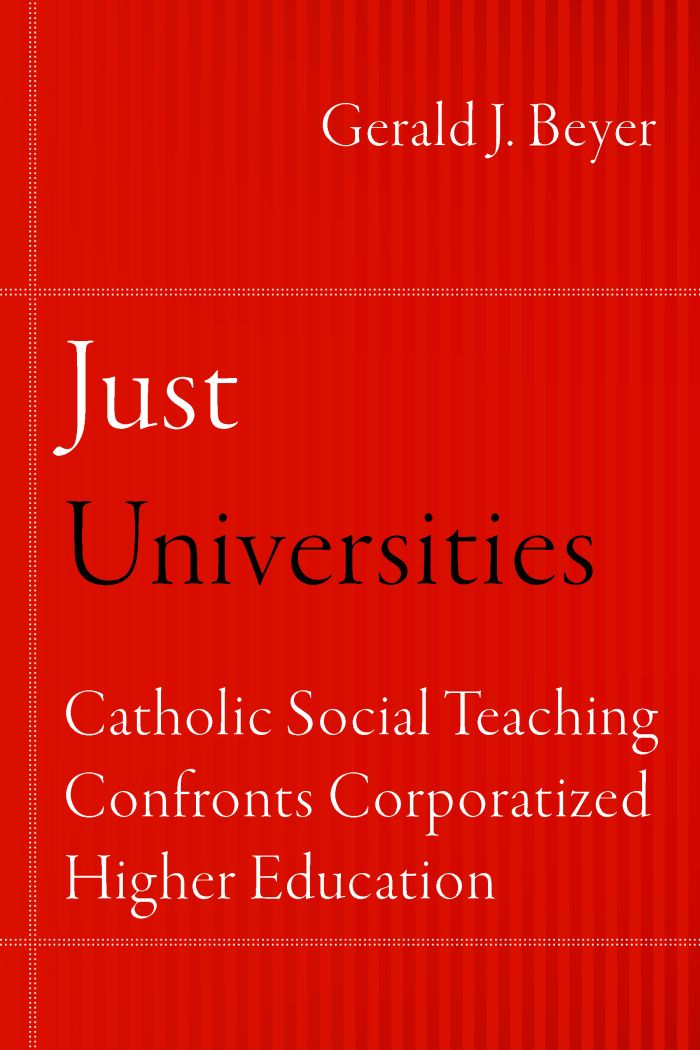Just Universities
Catholic Social Teaching Confronts Corporatized Higher Education

This book can be opened with

Third Place, Catholic Media Association: Catholic Social Teaching
Gerald J. Beyer’s Just Universities discusses ways that U.S. Catholic institutions of higher education have embodied or failed to embody Catholic social teaching in their campus policies and practices. Beyer argues that the corporatization of the university has infected U.S. higher education with hyper-individualistic models and practices that hinder the ability of Catholic institutions to create an environment imbued with bedrock values and principles of Catholic Social Teaching such as respect for human rights, solidarity, and justice. Beyer problematizes corporatized higher education and shows how it has adversely affected efforts at Catholic schools to promote worker justice on campus; equitable admissions; financial aid; retention policies; diversity and inclusion policies that treat people of color, women, and LGBTQ persons as full community members; just investment; and stewardship of resources and the environment.
Open this book and meet on the very first page, Jerry Beyer, a working-class man, trained every step of the way through Catholic education to becoming a professor at two Catholic universities, who raises some heart-felt, unflappable questions about whether Catholic mission is compromised by the corporate model that it has made its own. In this book, Beyer brings to the new field of university ethics the case of the Catholic Colleges and Universities, asking are they practicing what they teach: are Catholic lessons of worker solidarity evident in their treatment of adjuncts, is gender equity for the books or for the administrative offices, is racial justice a dream or a campus reality, and if the church's mission is to break the cycle of poverty, why are so many of the poor and working class unable to get into the Catholic schools? It is not an indictment, but a compelling plea to make mission drive the model. Bravo, Jerry!—James F. Keenan, S.J., author of University Ethics: How Colleges Can Build and Benefit from a Culture of Ethics
Campuses across the country are reckoning with their histories of inequality ranging from institutional racism to largely serving wealthy white students. This reckoning is made even more challenging by the larger neoliberal or corporatized environment that renders the enterprise to new forms of inequality such as exploitive labor and investment practices. Catholic institutions are not immune to and have participated in the same inequalities historically and currently. Just Universities highlights how Catholic institutions have followed the patterns of inequality within the larger enterprise of higher education and even created even further inequalities for LGBTQ faculty, staff and students as well as gender inequalities that are even often more pronounced. Just Universities is packed with data, a synthesis of multitudes of sources, personal anecdotes, and philosophical ponderings that are thoughtfully and carefully assembled to expose these challenges and also create the case for Catholic higher education to use its own teaching to match its aspirations for being socially just. Just Universities is compelling in making the case and inspirational in its call to action.—Adrianna Kezar, Wilbur Kieffer Endowed Professor and Dean's Professor of Leadership, University of Southern California, Director of the Pullias Center (pullias.usc.edu), and Director of the Delphi Project
In Just Universities, Jerry Beyer presents a remarkable analysis of the relationship between Catholic institutions of higher education and Catholic social teaching that will set the framework for all future explorations of the relationship between these two realms of the Catholic experience and tradition. Beyer’s choice of issues to examine are pointed and timely, and his analysis is both theoretically sophisticated and practically relevant. Some of the topics he explores are at the forefront of the current dialogue: the ‘corporatization’ of Catholic higher education; just wages; the status of adjunct faculty; unionization of faculty; institutional financial investments; environmental and climate justice; and issues of inclusion based on race, gender, sexual identity, and class, among others. Just Universities is a must-read for all engaged in these critical issues. As a Catholic college president, I am indebted to Beyer for what he has provided to those in positions of leadership. His analysis should be the framework for all future discussions on these topics, and higher education should be most grateful for Beyer’s contribution.—James A. Donahue, President of St. Mary’s College of California
Just Universities is a must read for all faculty and administrators.—Collegium
[A] pioneering, much-needed book... This book is essential reading for anyone interested in university ethics and religious higher education...—Anglican Theological Review
Just Universities is sure to become a seminal text for future research and discussions on this topic and will be a valuable addition to library collections at all colleges and universities, secular as well as religious. Highly Recommended.
—Choice
This highly successful book therefore ought to be taught throughout Catholic colleges campuses because it teaches how effective Catholic social teaching is and ought to be precisely in the places where students are learning and faculty are instructing. It helps us to be aware of the old ethical insight that we understand as well as we perceive, and that depends on the environment in which we learn.—Horizons: The Journal of the College Theology Society
Preface | ix
Introduction | 1
1 The Mission of Catholic Higher Education in
the Age of the Corporatized University | 11
2 Embodying Solidarity on Catholic Campuses:
The Case of Worker Justice | 47
3 Catholic Universities, the Right to Education, and the Option
for the Poor: Recruiting, Admitting, and Retaining Economically
Disadvantaged Students | 90
4 Socially Responsible Investment, the Stewardship of University
Resources, and Integral Ecology | 135
5 Racial Inclusion and Justice at Catholic Colleges and Universities:
From Tokenism to Participation | 169
6 Gender and LGBTQ Equality in the University:
A Challenge for CST in the Age of Corporatized Higher Education | 207
Epilogue | 249
Appendix: Embodying Catholic Social Teaching on Campus Sample Questionnaire | 257
Acknowledgments | 269
Notes | 273
Index | 409




